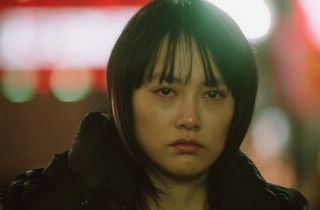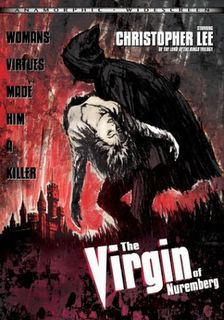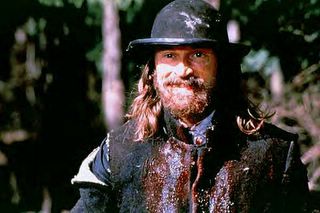Babel
Alejandro González Iñárritu's informal trilogy of alinear ensemble dramas - Amores Perros, 21 Grams and the new release Babel - center on accidents and traumas that unite disparate strangers. Taken together, they insist that we discover ourselves in times of crisis as opposed to peace, that the only true and honest moments occur when our perceptions about the world collide with harsh reality. Call it the Accidental Trilogy.
Though all three of these films have their merits, I remain unmoved by Iñárritu's passion for non-chronological storytelling. It makes some measure of sense as structural metaphor - we see the stories unfold in a jumble to simulate the fog of interconnectedness in which we all live. Our actions all directly impact others and yet we remain blissfully unaware of the far-reaching consequences of everyday decicions, operating under the illusion of randomness. Iñárritu jumps around, always showing us the how's of any given situation but leaving all the other important answers - who? why? - for the end, because that's how we live. We don't get to know everyone we meet up with during our daily adventures. We just encounter them and proceed from there.
Theoretically, the notion is sound, if a bit cerebral and High Modernist for a 21st Century filmmaker. In practice, Iñárritu doesn't really get the most out of the technique. His films tend to feel as if they are about to reveal some grand, transcendent truth about human life, but they never quite get there. Amores Perros makes the best, if most gimmicky, use of the chaotic structure. 21 Grams always felt to me like a great movie buried beneath a bunch of pointless, busy and intrusive over-direction. Babel employs Iñárritu's favored method with the most grace and subtlety of the three but nevertheless fails to turn its handful of interesting short stories into something more than the sum of its parts. All the tangential elements feel as if they're going to come together, they seem on the verge of coming together, but they never truly come together. Unfortunately, it's a well-made, interesting miss.
What's most impressive about Iñárritu's direction this time out is his ability to maintain intensity over the course of a 2.5 hour film. Babel darts between four different sets of characters, all of them in the midst of a crisis situation. It's the anti-Crash. Paul Haggis' miserable disgusting failure focuses on a variety of interconnected stories in which the mundane details of a typical day in Los Angeles (or what was meant to signify a typical day) paint a broad picture of race relations in modern America.
(He goes so far as to suggest that secret, unspoken, burning desires guide our everyday actions. For example, that we Angelinos get into car crashes not out of carelessness but a need to meet n' greet our faceless neighbors.)
In Babel, Iñárritu examines abstracts like Hope and Dread by putting his characters into severe distress and then watching them claw their way out. These are not everyday frustrations and annoyances, the kind of encounters to which any of us in the audience can theoretically relate, but wrenching and life-altering tragedies. The latter approach yields a more compelling and watchable, if emotionally draining, finished product.
In Morocco, two brothers (Boubker Ait El Caid and Said Tarchani) fire their father's new rifle off a mountaintop. When they connect with a bus full of tourists and realize that the game has suddenly turned deeply serious, they ditch the gun and run home to feign ignorance. The bullet has entered with the chest of the unsuspecting Susan (Cate Blanchett), an American on vacation with her husband Richard (Brad Pitt) as an escape from troubles at home.
In trying to save his wife's life, Richard will confront a number of perplexing obstacles. The nearest hospital is 4 hours away and Susan is in no shape to travel. The local ambulance cannot be found. The other tourists on the bus don't feel safe in a Moroccan village after dark. Even the American embassy won't help - there are concerns that this might have been a terrorist attack, which could cause diplomatic complications.
Pitt's pretty solid in these sequences. It's a demanding role, developing a character who spends the entire film in a cold sweat. With his wife unconcious most of the time and the locals speaking in halted, broken English, he's at the center of almost all the Moroccan material, which makes up a little under 1/2 of the movie. Along with Fight Club and 12 Monkeys, it's one of his rare worthwhile performances. (He's fun in stuff like Ocean's Eleven, but generally the guy's coasting on his looks and charm and you can tell.)
The film's other two stories take place in Mexico and Japan. Iñárritu does eventually explain the connections between these stories to the "main" action in Morocco but they're both pretty thin and not particularly meaningful.
Richard and Susan's blonde moppets (Nathan Gamble and Dakota Fanning's clone sister Elle) have been left behind in San Diego, in the care of the family's faithful Mexican nanny Amelia (Adrianna Barraza). When Mom and Dad are delayed in-country by that regrettable stray bullet, Amelia is forced to take her charges across the border into Mexico for her son's wedding. The intial portion of their trip provides the film's lone upbeat, happy scenes, with Amelia's nephew Santiago (Gael Garcia Bernal) driving the kids on a whirlwind tour of Baja California followed by the actual wedding, but the journey back into the United States proves more problematic.
Meanwhile, in Japan, a deaf-mute teenaged girl (Rinko Kikuchi) and her befuddled father (Kôji Yakusho) come to terms with one another in the wake of her mother's suicide. Thematically, Chieko and her search for a human connection mirrors the film's other sections, which all focus on communication breakdowns, but Iñárritu properly connects this story to the others at the very end. When the explanation finally comes, it's fairly far-fetched and not exactly the momentous turnaround the movie seems to anticipate.
Over the course of the four narratives, Iñárritu and co-screenwriter Guillermo Arriaga (who collaborated on the entire trilogy) develop a number of provocative ideas. As a part of their larger examination of the collision between perceptions and reality, they spend time probing the stereotypical, simplistic and frequently damaging perceptions people hold about one another, particularly Americans as they regard foreigners.
Susan and Ricahrd's kids are afraid at first to go to Mexico, because their parents have told them it is a dangerous place. (Santiago agrees, pointing out that it's full of Mexicans.) Despite Susan's worsening condition, Richard has a hard time convincing his fellow busmates to stick around in a remote Moroccan village. They are afraid the Muslim locals will rob or murder them whilst they sleep.
Unfortunately, Iñárritu takes on so much in the film, working on a canvas that's so broad and filling it with so many scattered insights, a lot gets lost in the shuffle.
The Japanese sequences would probably work better as a stand-alone film. The connection to the main story about the bus shooting doesn't really do anything to advance our understanding of Chieko and her encroaching isolation. Her story closes out Babel and brings Iñárritu's Big Themes into the clearest relief.
What character could better express feelings of separation from humanity, an inability to make oneself understood, than a girl who cannot hear or speak? And what more clear invocation of raw human pain could be imagined than a girl desperately trying to find love after being abandoned by a beloved parent? Kikuchi's fantastic in the role - clearly one of the best female performances of the year - and her chemistry with Yakusho felt lived-in and palpable. Their final scene together ranks among the film's best, and ends the film on a moment of significant power.
Like The Prestige, The Black Dahlia and several other moderate 2006 disappointments thus far, Babel gets a whole lot right. Cinematographer Rodrigo Prieto (who shot the entire trilogy, along with 8 Mile and The 25th Hour) ably gives the various segments unique visual styles and color patterns. Again, I found the Japanese segments to be the most accomplished. That final shot works as well as it does in part because of the contrast between the blackness of the night sky and the vibrant neon lights of Downtown Tokyo.
Most of the performances, in addition to the standouts I already mentioned, are warm and vivid. Gael Garcia Bernal, who has already demonstrated his considerable ability in Y Tu Mama Tambien and Bad Education, had a huge year in 2006 with Science of Sleep, the exceptional direct-to-DVD The King and now Babel. His reckless chatterbox Santiago is the film's most funny and immediately likable character.
But taken as a whole, Babel is essentially a roiling mass of ideas in search of a movie, a humane vision of the meaning behind the randomness of our lives that's too big for one film to contain. I don't want to knock the film, really, because I admire its outsized ambition. But it's a bit too disjointed and messy to strongly recommend either. I left the movie feeling confused and a bit let-down, like I had seen something worthwhile but also incomplete.





